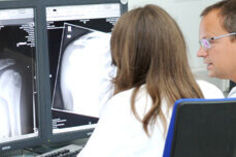LUCINDA
Early Lung Cancer Diagnosis Using Artificial Intelligence and Big Data

Lung cancer is the most common and most fatal cancer, causing 266 000 deaths every year in Europe and 1.6 million worldwide. In most patients lung cancer is diagnosed in advanced and thus non-curable stages. Despite new promising therapies, lung cancer survival is still poor. When detected early and treated adequately, the survival rate increases dramatically, up to overall 5 year survival rate of more than 80% for tumors sized 2 cm or less. Multidetector low-dose CT (LDCT) is able to detect lung cancer in early stages and reduce mortality by 20%. Being an effective approach for the detection of early lung cancer, the LDCT-screening bears some major challenges. The one with most impact is the high false-positive rate, which leads to unnecessary invasive diagnostics and anxiety of participants. Recent developments in CT-technique allow for the acquisition of 1-mm-collimation images of the whole chest in one breath-hold. The use of thinner collimation increases spatial resolution and leads to a better detection of small lung nodules at a size of less than 2 mm. Consequently the prevalence of CT-detected small lung nodules is with 30-50% very high, although, less than 1% of the smallest nodules are malignant. The purpose of the LUCINDA project is to develop a novel Lung Virtual Biopsy solution that will enable radiologists to diagnose lung cancer more confidently and efficiently and help improve outcomes while reducing the volume of unnecessary follow-up examinations by up to 50%.

Based on Digital Image Biomarker, Lung Virtual Biopsy will be the first solution that predicts malignancy from a single CT scan, by leveraging Artificial Intelligence (AI) and big data.
The LUCINDA project will:
- Develop a vast CT database, leveraging the expertise of top radiologists (Oxford, Heidelberg, Groningen), to ensure that the Digita
- Image Biomarker already validated at Oxford performs across CT scanner types throughout the EU
- Teach EU radiologists the value of AI, so helping the EU lead in its adoption to improve outcomes and cost-effectiveness across all diseases.
LUCINDA is funded by the EIT.





